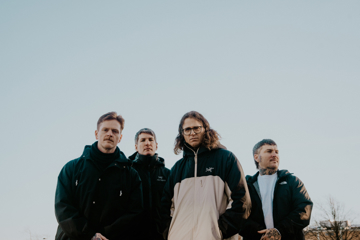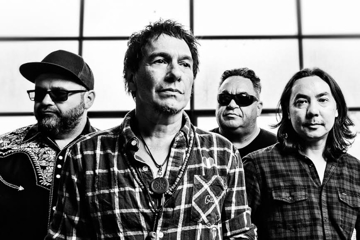Could The 'Black Panther' Soundtrack Revolutionise Popular Music In Film?
24 February 2018 | 11:14 am
|
Cyclone Wehner
'Black Panther The Album' signals a new chapter of artistry and innovation.'
Black Panther is a box office smash – and a cultural phenomenon. But it could also revolutionise a Hollywood system dominated by white dudes. Indeed, the Marvel Studios superhero film has a black director in Ryan Coogler and a largely black cast – leading women among them.
Black Panther centres on Wakanda, a secretive fictional nation in Africa. The Wakandans utilise a rare extraterrestrial resource, vibranium, for scientific, spiritual and magical purposes. The King Of Wakanda, known as the Black Panther, harnesses this, too, for his superhuman powers. Ascending the throne after his father's shock passing, T'Challa (played by Chadwick Boseman) confronts a mysterious rival in Erik "Killmonger" Stevens (Michael B Jordan). Black Panther has layered characters, complex mythology and nuanced allusions to identity, colonialism and geo-politics. Yet, ultimately it delivers sumptuous entertainment. What's more, the accompanying album, curated by Kendrick Lamar, is excellent with its future Afro-pop, trap 'n' trop, and avant 'n' B vibes.
Many are referring to Black Panther The Album (BPTA) as a "soundtrack" (or OST, 'Official Soundtrack') but, shortly pre-release, Universal Music circulated a presser, underlining the statement "This album is not a soundtrack". In fact, only three songs are heard in the movie, including All The Stars – a duet between Lamar and SZA used during the end credits. The remaining cuts are "inspired by" Black Panther, rendering the album conceptual. BPTA is comparable to Jay-Z's American Gangster, a companion to Ridley Scott's 2007 crime saga.
Still, working in tandem with Top Dawg Entertainment (TDE) boss Anthony Tiffifth and the stable's chief producer Sounwave, Lamar has ensured that BPTA complements Black Panther sonically and thematically. The MC personalises the project – as Prince did with 1989's Batman. In the opening title-track, Lamar assumes the role of T'Challa himself. Then, in King's Dead, he channels the disenfranchised Killmonger. Curiously, in the flick, T'Challa's sassy scientist sister Shuri (Letitia Wright) jokes about him taking her to Coachella, where K-Dot headlined in 2017.
BPTA might be Lamar's informal follow-up to DAMN. because he surfaces on almost every track. The MC has brought in TDE labelmates (ScHoolboy Q, Ab-Soul and Jay Rock), plus such buzz acts as Vince Staples, Travis Scott, Khalid, Jorja Smith and The Weeknd. Significantly, BPTA spotlights South African artists like femcee Yugen Blakrok (who blitzes Staples on Opps), Babes Wodumo, Queen Of Gqom, and Sjava. Predictably, BPTA has blockbuster bangers – notably Pray For Me, with Lamar and The Weeknd. But other inventive songs are emblematic of Wakanda's high-tech culture – cue the expressive Bloody Waters, featuring Ab-Soul, Anderson .Paak and Lamar's recent tour buddy James Blake (check out the production credit from ex-Rhye member Robin Hannibal).
CNN has suggested that BPTA will change the music industry – and even save the album. Nonetheless, black musicians have long orchestrated gamechanging soundtracks. Isaac Hayes started a boom in blaxploitation OSTs with 1971's Shaft double-LP on Stax Records. The Southern soulster was the first African-American composer to win an Academy Award, with Theme From Shaft named 'Best Original Song'.
The '90s ushered in the urban-movie-with-soundtrack paradigm. In 1991, Mario van Peebles' street drama New Jack City capitalised on the nascent New Jack Swing genre Teddy Riley pioneered. The same year, John Singleton presented Boyz N The Hood, with NWA's Ice Cube both starring in the film and on the OST. Singleton was the earliest black American nominated for 'Best Director' and 'Best Original Screenplay' at the Oscars.
The music biz quickly recognised the value of urban (R&B and hip hop) soundtracks – as did those singers and rappers pursuing Hollywood roles on the side. The new super-producers were well positioned to curate. Established artists serviced songs to maintain their profiles (Janet Jackson's The Best Things In Life Are Free with Luther Vandross materialised on the Jam & Lewis-helmed Mo' Money). And labels introduced artists on the albums.
If gangsta rap went mainstream, it was partly due to soundtracks. Death Row's compilation for the basketball flick Above The Rim(with Tupac Shakur) spawned a G-funk crossover hit in Warren G's Nate Dogg-assisted Regulate. The next year, Coolio became a household name with Gangsta's Paradise (featuring LV) fromDangerous Minds – a vehicle for Michelle Pfeiffer portraying a teacher helping disadvantaged students.
One of the most memorable R&B OSTs was that supplementing Jason's Lyric – a gritty romance starring Allen Payne, Jada Pinkett and… Treach of Naughty By Nature. Jodeci's K-Ci Hailey covered Bobby Womack's '80s soul jam If You Think You're Lonely Now – indirectly reviving Womack's career.
Whitney Houston emerged as the '90s' Soundtrack Queen with the mega-selling The Bodyguard – encompassing her soulful rendition of Dolly Parton's I Will Always Love You. She subsequently appeared in, and contributed to, Waiting To Exhale – a movie celebrating black women's friendships adapted from Terry McMillan's novel. (Coincidentally, Black Panther's Forest Whitaker directed.) Babyface facilitated the OST's huge roster of intergenerational R&B female talent (Mary J Blige stealing the show with her signature ballad Not Gon' Cry). Aspiring divettes emulated Houston in the 2000s. Aaliyah made her silver-screen debut opposite Jet Li in Romeo Must Die – a cross-cultural twist on Shakespeare. Timbaland supervised the OST, with Aaliyah cutting Try Again. Meanwhile, Beyonce – whose group Destiny's Child premiered on Will Smith's Men In Black OST of 1997 – played in MTV's sadly forgotten Carmen: A Hip Hopera, with a postmodern soundtrack indebted to Baz Luhrmann.
The '90s even had black superhero movies. Shaquille O'Neal starred in Steel, based on the DC Comics character – with Quincy Jones as a producer. It was a massive flop. But the OST, issued via Jones' Qwest Records, is a lost classic (Gina Breedlove shoulda been a neo-soul idol on the back of Free To Be Me). More successful was Blade, with Wesley Snipes as the titular vampire hunter – another black Marvel superhero. Though hip-hop-oriented, the Blade OST embraced the nascent EDM movement.
In 2002 Eminem – hip-hop's white working-class anti-hero – generated his own mythology with the semi-autobiographical 8 Mile. The OST contained Lose Yourself – which reached US#1 and won hip-hop an elusive Oscar. The popularity of the urban soundtrack determined the marketing of franchises like Step Up(the first instalment of which had a song by Aussie Samantha Jade) and The Fast And The Furious. Alas, with the music industry contracting in the 2010s, the format lost currency – and 'genre' soundtracks were considered redundant. However, by being curated for the playlist era, Black Panther The Album signals a new chapter of artistry and innovation. The Wakandans would dig it.







